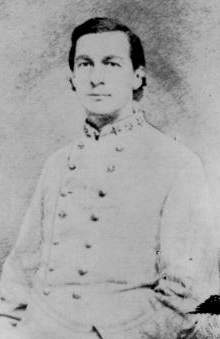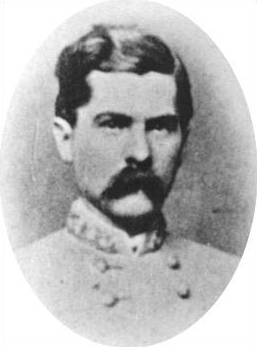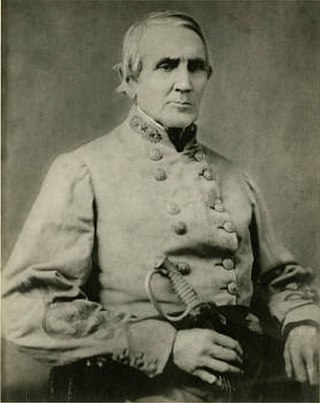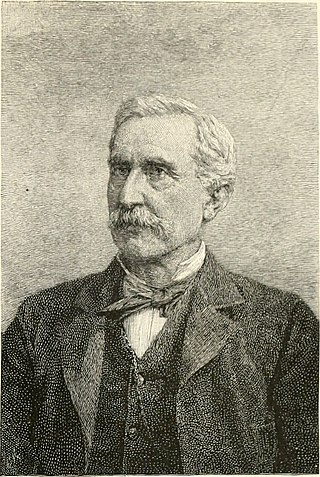Military leadership in the American Civil War was vested in both the political and the military structures of the belligerent powers. The overall military leadership of the United States during the Civil War was ultimately vested in the President of the United States as constitutional commander-in-chief, and in the political heads of the military departments he appointed. Most of the major Union wartime commanders had, however, previous regular army experience. A smaller number of military leaders originated from the United States Volunteers. Some of them derived from nations other than the United States.

Arthur Pendleton Bagby Jr. was an American lawyer, editor, and Confederate States Army colonel during the American Civil War. Confederate General E. Kirby Smith, commander of the Trans-Mississippi Department assigned Bagby to duty as a brigadier general on April 13, 1864, to date from March 17, 1864, and as a major general on May 16, 1865. These extra-legal appointments were not made official by appointments of Bagby to general officer grade by Confederate President Jefferson Davis or by confirmation by the Confederate Senate.

The Army of Central Kentucky was a military organization within Department No. 2. Originally called the Army Corps of Central Kentucky, it was created in the fall of 1861 as a subsection of Department No. 2, and continued in existence until the end of March 1862 when it was absorbed and merged into the Army of Mississippi, which was then re-organized as the Army of Tennessee on November 20, 1862.
The Army of the Peninsula or Magruder's Army was a Confederate army early in the American Civil War.
The Army of the Northwest was a Confederate army early in the American Civil War.

William George Mackey Davis was a Confederate States Army brigadier general and blockade runner during the American Civil War. He was a lawyer and cotton speculator before the war and a lawyer in Washington, D.C., after the war.

Tyree Harris Bell was a Confederate States Army brigadier general, during the American Civil War.

Alexander William Campbell, was a Confederate States Army brigadier general during the American Civil War. He was a lawyer in Tennessee before and after the war, mayor of Jackson, Tennessee, 1856, and an unsuccessful candidate for the Democratic Party nomination for governor of Tennessee in 1880.

George Blake Cosby, was a Confederate States Army Brigadier General during the American Civil War. He was an 1852 graduate of the United States Military Academy and served in the United States Army until May 10, 1861. After the war he farmed in California, worked as aa sutler in Oregon and held several government positions.

William Polk Hardeman was a Confederate States Army brigadier general during the American Civil War. He had fought in the Texas War of Independence in 1836. He was a member of the Texas Rangers and fought in the Mexican-American War in 1846–1847. During the Civil War, he participated in Brigadier General Henry Hopkins Sibley's New Mexico Campaign and in the Red River Campaign. He had a variety of occupations after the war, including superintendent of public buildings and grounds at Austin, Texas.

Alfred Eugene Jackson was a Confederate States Army brigadier general during the American Civil War. Before the war, he was a farmer, produce wholesaler, miller, manufacturer and transporter of goods by wagon and boat. After the war, he was a tenant farmer in Virginia until he regained some of his property in Tennessee. Jackson owned 20 slaves.

William Whann Mackall was a Seminole Wars veteran, Mexican–American War veteran and Confederate States Army brigadier general during the American Civil War. He was a United States Army officer for 24 years before he resigned his commission in order to join the Confederate Army. After the Civil War, he was a farmer in Fairfax County, Virginia.

Daniel Harris Reynolds was a Confederate States Army brigadier general during the American Civil War. He was born at Centerburg, Ohio, but moved to Iowa, Tennessee, and finally to Arkansas before the Civil War. He was a lawyer in Arkansas before the war. After the war, Reynolds resumed his practice of law and was a member of the Arkansas Senate for one term.

Claudius Charles Wilson was a Confederate States Army colonel and brigade commander during the American Civil War. Wilson's promotion to brigadier general on November 16, 1863, was confirmed posthumously. Wilson was a lawyer and U.S. Solicitor general for eastern Georgia before the Civil War. Wilson died of a fever while in camp at Ringgold, Georgia, on November 26, 1863.

Horace Randal was a Confederate States Army colonel during the American Civil War. Randal was mortally wounded while commanding a brigade at the Battle of Jenkins' Ferry, Arkansas on April 30, 1864, dying two days later. Confederate President Jefferson Davis did not act upon a request made by General E. Kirby Smith on November 8, 1863, to promote Randal to brigadier general. After Randal's performance at the Battle of Mansfield, General Smith, as the Confederate commander of the Trans-Mississippi Department, assigned Randal to duty as a brigadier general on April 13, 1864. Randal was not officially promoted. Jefferson Davis subsequently revoked Smith's appointment of Randal as a brigadier general.
Benjamin Franklin Gordon, commonly known as B. Frank Gordon, was a Confederate States Army colonel during the American Civil War. Gordon had been a private and bugler for a Missouri regiment serving in the U.S. Army during the Mexican–American War. Gordon served in the Confederate Army under Brigadier General Joseph O. "Jo" Shelby in Missouri and Arkansas in the Confederate Trans-Mississippi Department throughout the war. On May 16, 1865, with the war coming to an end, General E. Kirby Smith, as the Confederate commander of the Trans-Mississippi Department, assigned Gordon to duty as a brigadier general. The Confederate government took no action on the appointment and Confederate President Jefferson Davis did not officially appoint and nominate Gordon to the rank of brigadier general because the Confederate Senate last met on March 18, 1865, and Davis was captured by Union troops on May 10, 1865. Although he was only aged 40 at his death, Gordon survived the war by little more than a year.

Wilburn Hill King was a Confederate States Army colonel during the American Civil War. He was assigned to duty as a brigadier general by General E. Kirby Smith but he was not officially appointed and confirmed to that grade.

Levin Major Lewis was a Confederate States Army colonel during the American Civil War. On May 16, 1865, he was assigned to duty as a brigadier general by General E. Kirby Smith when the war in the Trans-Mississippi Department was almost over, but he was not officially appointed by Confederate President Jefferson Davis and confirmed by the Confederate Senate to that grade.
Robert Plunket Maclay was a Confederate States Army major during the American Civil War. On May 13, 1864, he was assigned to duty as a brigadier general to rank from April 30, 1864, by General E. Kirby Smith. He was never officially appointed by Confederate President Jefferson Davis and confirmed by the Confederate Senate to that grade.

The Battle of Riggins Hill was a minor engagement in western Tennessee during the American Civil War. A Confederate raiding force under Colonel Thomas Woodward captured Clarksville, Tennessee, threatening Union shipping on the Cumberland River. Several Union regiments led by Colonel William Warren Lowe advanced from nearby Fort Donelson and drove off the Confederates after a struggle lasting less than an hour. The action occurred during the Confederate Heartland Offensive but only affected the local area.














